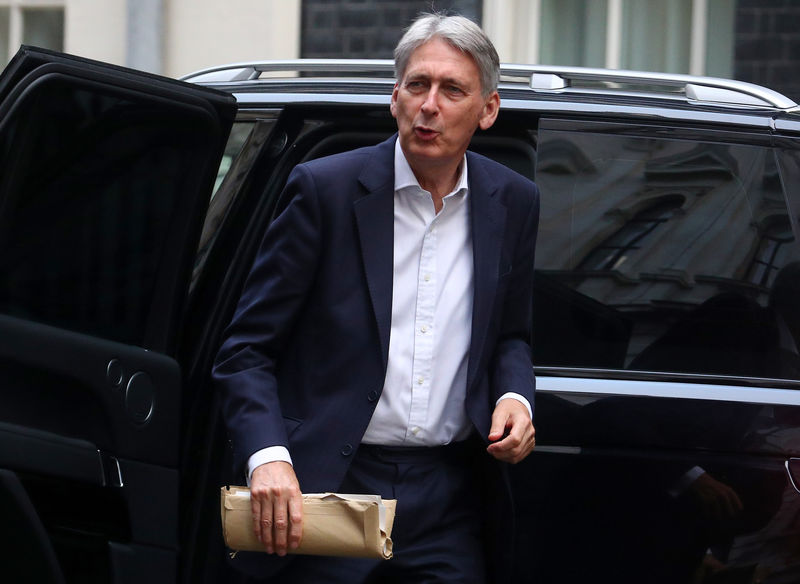By Andy Bruce and Andrew MacAskill
LONDON (Reuters) - Britain's government recorded a smaller budget deficit than expected in September, but the improvement is unlikely to give much help to finance minister Philip Hammond as he prepares his annual budget.
The deficit in September fell to 4.123 billion pounds ($5.38 billion) from 4.958 billion pounds a year before, the Office for National Statistics said. A Reuters poll of economists had pointed to a reading of 4.5 billion pounds.
The figures also showed a sharp downward revision for August's deficit.
For the first six months of the 2018/19 financial year, the deficit stood at 19.9 billion pounds, down 35 percent on the previous year and the lowest at this stage of the year since 2002.
But few economists expect Hammond to unveil major shifts in spending in his budget on Oct. 29, five months before Brexit.
London and Brussels have yet to strike a divorce agreement and Britain's official budget forecasters have said Brexit is more likely to harm than help public finances.
Earlier this month Prime Minister Theresa May pledged an end to austerity, but Hammond's room for manoeuvre is limited.
He has yet to explain how he will finance May's promise of higher health spending, which will add 20 billion pounds to the National Health Service budget by 2023/24.
PRESSURE AHEAD
The ageing of the population will pressure public finances in the years ahead even before considering Brexit's impact, according to the Office for Budget Responsibility (OBR) which produces the forecasts that underpin Britain's budget plans.
Yael Selfin, chief economist at KPMG UK, said the extra leeway in Hammond's budget from the better-than-expected performance of the public finances this year was unlikely to help him much in the longer term.
"The extra pot is unlikely to be sufficient for all these demands, and the chancellor will ultimately need to opt for either higher debt or higher taxes in order to meet these," she said.
Andrew Wishart, economist from consultancy Capital Economics, said Hammond was unlikely to remain on track to eliminate the deficit entirely by the mid-2020s.
Friday's figures implied government borrowing by the end of this financial year could be about 11 billion pounds lower than the 37.1 billion pounds it forecast in March, based purely on the current rate of progress, the OBR said.
But it added that its new forecasts for the coming budget would also need to take into account the handling of corporation tax receipts and the ebb and flow of various tax and spending streams.
Hammond wants to steadily cut national debt as a share of GDP, which he says is too high to easily support a big rise in public spending during a future recession.
Public debt stood at 1.79 trillion pounds in September, or 84.3 percent of gross domestic product, down from 86.7 percent in the same month of 2017 but double its level before the financial crisis.
The headline public sector net debt figures are inflated by a temporary Bank of England lending stimulus scheme which is due to be repaid this year - something which makes it near-certain that Hammond will achieve his goal of lowering debt as a share of GDP.
Robust growth in sales and income tax receipts continued in September, offsetting a recent rise in government spending.
